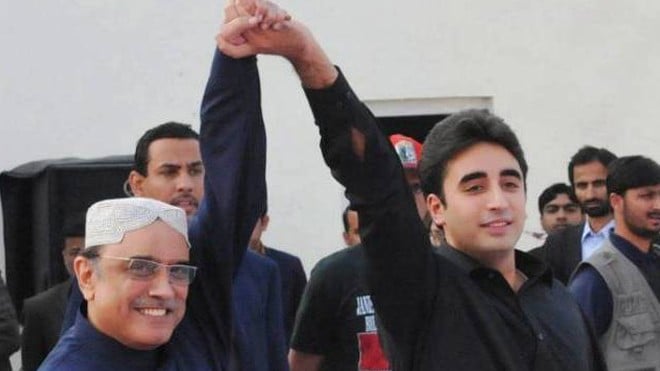
Are the leaders of the PPP and PML-N getting cozy to ensure no fallout from the Panama Papers case? Or, simply, is the crafty Zardari gearing up for 2018?

"There is no doubt that [Prime Minister] Nawaz Sharif has struck a deal with Asif Zardari to hide his corruption and due to fear of the Panama Papers case," said Chairman Pakistan Tehreek-e-Insaf, Imran Khan, in the immediate aftermath of the release of Dr Asim Hussain, former Petroleum Minister, and perhaps more importantly, the alleged front man of the PPP Co-Chairperson, Asif Ali Zardari.
To be fair, the timing of all recent goings-on related to the PPP are interesting. Within a short span of time, Asif Ali Zardari along with Sharjeel Memon have returned to Pakistan, former Minister Hamid Saeed Kazmi has been acquitted in the Haj scam case, and Dr Asim Hussain has been released.
The detentions, in particular, are important, as they were seen a ‘means to an end’, the end being Asif Ali Zardari.
It was recently argued in an opinion piece carried by this newspaper, that the detentions, particularly Dr Hussain’s, "was a crucial factor in the vain attempt to apply a minus-one formula on the PPP".
So, was a deal struck? If so, with whom? Was it the courts? Or the establishment? What about the PML-N?
"Both the cases went through lengthy court battles," says political analyst Suhail Warraich. "And the judges who gave these verdicts are free from any sort of political pressure, so I cannot understand how a deal with the courts could have happened."
Warraich argues that if there is some sort of understanding between political parties, its effect does not reach the courts, and that the impact of the courts does not reach the political parties either - "These are two separate things which should not be mixed up," he says.
So, could there be some truth to Imran Khan’s claims that the leaders of the PPP and PML-N got cozy to ensure no fallout from the Panama Papers case?
"Zardari is consciously trying to distance himself from Nawaz Sharif," says Warraich. "He [Zardari] understands that the tag of a friendly opposition hurt the party in the last elections as they were wiped out in Punjab."
This opinion has some credence. Of late, the PPP has come out vocally against the PML-N and Prime Minister Nawaz Sharif specifically. Recently, while addressing a public gathering on the 38th death anniversary of Zulfikar Ali Bhutto, the PPP Chairman, Bilawal Bhutto Zardari said, "Enough is enough, now Mian Sahib will have to go."
This is not how allied parties behave. Or is there more to this?
Warraich explains that a more active PPP, especially in Punjab, will not hurt the PML-N as much as it will the PTI, which is now a leading opposition party in the province.
"If there is some sort of understanding, it seems to be based on broadening the bi-polar conflict which emerged between Imran Khan and Nawaz Sharif in 2013," explains Dr Mohammad Waseem, Professor of Political Science at the Lahore University of Management Sciences (LUMS). "Probably the calculation is that the PML-N doesn’t lose by bringing in the PPP, even if the PPP wins one to 10 seats, that will be at the cost of not the PML-N, but the PTI."
Dr Waseem further elaborates that in Sindh, if there is a quid pro quo, the PPP is not going to suffer by PML’s entry.
Another rumour doing the rounds was that the minus one formula being applied by "somebody" was to dismember Zardari from the party so that he could be taken to court over corruption charges. The same rumour alleged that the same somebody was pushing for Bilawal to take the iron throne, as his inexperience in politics would further hurt the PPP’s chances. However, upon his return to Pakistan, Asif Ali Zardari has resumed his position as the de facto head of the party.
"Although Asif Ali Zardari was able to keep the PPP together for five years, towards the end, his profile had become a burden for the party by way of corruption scandals and other issues such as Memogate and the Kerry Lugar bill," says Dr Waseem. "Even PPP-walas were afraid that that would mean electoral defeat, and it happened."
To Dr Waseem, this was the main reason that Bilawal Bhutto Zardari was brought forward in Zardari’s absence. However, the young prince was unable to live up to his family’s legacy. "Hence, the authority continued to lie with the elder man," he says.
This view is taken forward by Warraich who believes that Zardari is a wily politician who is willing to push Bilawal forward while he continues to control the party from the backseat. "He [Zardari] believes that the time is not right to launch Bilawal," he says.
All eyes are now on 2018. And according to Dr Waseem, with the passage of nearly five years, "the tarnished image of Zardari has somewhat receded. Most commentators believe that at best, the PPP will be able to get into some sort of seat adjustment situation, and an outright win is beyond the realm of possibility."